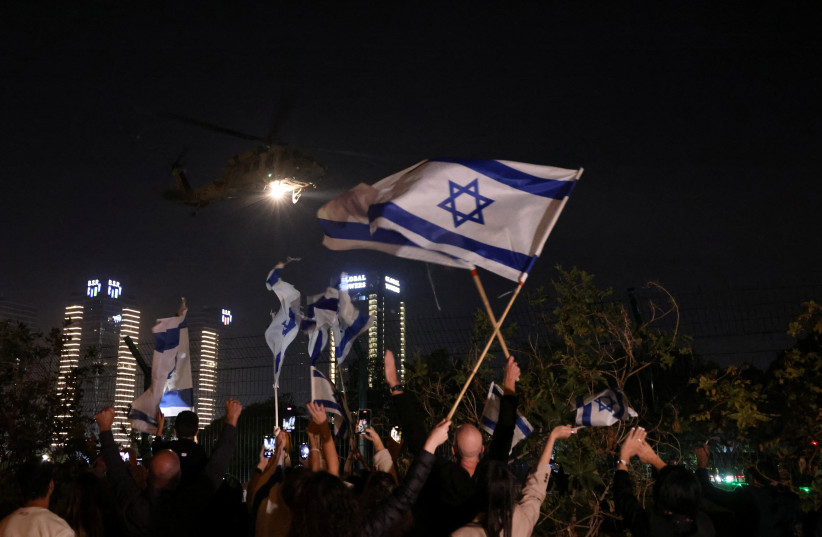With the horror, tension, and uncertainty we all grapple with as the days drag by, we must not ignore the unexpected, incidental gift that we have uncovered: national unity at levels we have never seen and could hardly have imagined. The question on my mind is this: How do we “bottle” and preserve that sense of harmony to keep reaping its benefits?
This must not be an “only in times of tragedy” dynamic that we abandon once our lives settle down. That would be a tragic missed opportunity: pathetic, wasteful, and heartbreaking. To continue to maintain and benefit from it, we must figure out what fundamental trigger led to this feeling.
Here’s an intriguing exercise: Let’s assess the mistakes we made on the military level and then investigate to determine if similar errors almost tore our country apart from within, socially and politically, over the last year.
All analysts agree that we relied too heavily on our technology in, over, and around Gaza. We spent billions building an impenetrable underground sensor system, combined with smart cameras and technological fences; we convinced ourselves that enemy activity could be detected in plenty of time for our defense forces to mobilize and withstand an attack. That was the “conceptzia” – the misconception that drove a long list of error-prone, ultimately fatal decisions.
Of course, we were wrong. We downplayed our human intelligence, declined to discuss and debate, and even minimized our interaction with the enemy – and it is costing us. Reports from the “spotters” on the border were ignored instead of examined. Had we met the enemy in close physical proximity instead of behind computer screens, and had we initiated more open discussion with a wider variety of analysts not bought into the status quo, we could have been much more aware of the impending threat and perhaps even prevented it.

We have self-segregated into political tribes
This is where I see a strong parallel: On a societal level, our face-to-face discussions and emphasis on personal engagement have also plummeted. Most of us, of course, rightfully blame the echo chamber of social media. But it goes beyond that. Over the past decade, we have gone down a path of living among those similar to us, interacting with friends and colleagues of similar opinions, and going to schools where students and teachers are all cast in the same mold. While this approach creates a comfortable micro-identity, it also makes us incredibly specific in our ideas as everyone around us reinforces them.
Our politicians, of course, prey on this dynamic, as each talks only to his or her own voter base. As we saw with the Supreme Court debacle, both sides lost the ability to listen, debate, and then compromise. We have lost our humility and our ability to admit that perhaps we were wrong – or, at least, that some of what we believe may be unfounded or misguided when confronted with new, even contradictory facts and arguments. We are simply not interested in considering that the “other side” offers something we can learn from.
We are hearing that these tensions are easing, anecdotally, as we read, hear, and see stories from the front lines. Soldiers “stuck” in the same tank realize that even though one is right-wing and one is left-wing, they are nonetheless willing to die for one another. Discussions reveal that they agree on 85% of the issues and are learning to either compromise or agreeably disagree on the rest. I’ve even had someone returning from the battlefield tell me that they are realizing, together, how angry they are at the media and the politicians for making them think that the other side is our enemy.
I find myself tearing up seeing videos of volunteers working and teaching at the hotels of the evacuees, grilling for the soldiers on the army bases, picking eggplants and pomegranates in the fields, and all the while realizing that when we meet “the other,” our “conceptzia” falls apart – all of the preconceived notions and stereotypes shatter at once. It’s actually a lot simpler and more gratifying to have those conversations, even when they are tough.
So maybe – just maybe – that is how we can harness this unity for the long term. We must double down and find more out-of-the-box, creative ways to interact with “the other.”
We cannot rely on our current educational framework of a siloed educational system to do the job for us – because it won’t. We cannot rely on community outreach programs to do their part because most of us have chosen to live near people who are just like us. And we certainly cannot rely on the media or the government, which seem to only gain by shoring up their positions by keeping us apart.
We must find the time and the place to exchange opinions and views. We cannot go back to a pre-October 7 world where we thought those on the other side of the political or religious aisle were our enemies. We have enough real enemies in Gaza, Lebanon, Jenin, Iran, on the streets of Europe, and on university campuses. We must rely only on our national community, with whom we can build together something systematically and proactively engaging — not to beat each other down but to win the battle for unity and not only in times of tragedy.
The writer is international director of the Gesher Organization.
